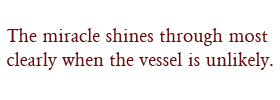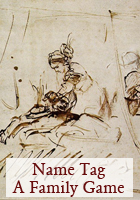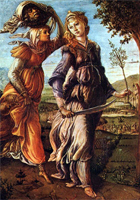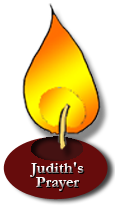The final chapter of the Book of Judith is the prayer of thanksgiving, which Judith sang responsively with the people. The prayer contains within it many of the classical biblical motifs found in the Song of the Sea and the Song of Deborah. We will focus on one stanza that contains a fascinating detail that puts a new spin on miracles.
But the Lord Almighty has foiled them by the hand of a woman. For their mighty one (Holofernes) did not fall by the hands of the young men, nor did the sons of Titans strike them down, nor did tall giants set upon him; but Judith daughter of Merari with the beauty of her countenance undid him.
(Judith, 16:5-6)
Judith talks of the Lord as a man of war. She speaks of His deliverance, His grandeur, and awesome might in the face of all of the forces of evil. She then focuses on the incredulity of the all-powerful Holofernes falling at the hands of a woman. The ignominy of that fact reverberated through the land. This notion finds expression in the Bible. The story of Abimelech the son of Jerubbaal, for example ends on a similar note:
Abimelech proceeded to Thebez; he encamped at Thebez and occupied it. Within the town was a fortified tower; and all the citizens of the town, men and women, took refuge there. They shut themselves in, and went up on the roof of the tower. Abimelech pressed forward to the tower and attacked it. He approached the door of the tower to set it on fire. But a woman dropped an upper millstone on Abimelech's head and cracked his skull. He immediately cried out to his attendant, his arms-bearer, "Draw your dagger and finish me off, that they may not say of me, 'A woman killed him!'
(Judges 9:50-55)
Another episode in the Book of Samuel describes Joab's attempt to capture Sheba son of Bichri who has rebelled against King David. He is unable to do so without the aid of the wise woman of Abel of Beth-maacah. She is responsible for Sheba's decapitation and the deliverance of the city.
All the troops with Joab were engaged in battering the wall, when a clever woman shouted from the city, "Listen! Listen! Tell Joab to come over here so I can talk to him." He approached her, and the woman asked, "Are you Joab?" "Yes", he answered; and she said to him, "Listen to what your handmaid has to say," "I'm listening," he replied. And she continued, "In olden times people used to say, "Let them inquire of Abel,' and that was the end of the matter, I am one of those who seek the welfare of the faithful in Israel. But you seek to bring death upon a mother city in Israel! Why should you destroy the Lord's possession?" Joab replied, "Far be it, far be it from me to destroy or to ruin! Not at all! But a certain man from the hill country of Ephraim, named Sheba son of Bichri, has rebelled against King David. Just hand him alone over to us, and I will withdraw from the city." The woman assured Joab, "His head shall be thrown over the wall to you." The woman came to all the people with her clever plan; and they cut off the head of Sheba son of Bichri and threw it down to Joab. He then sounded the horn; all the men dispersed to their homes, and Joab returned to the king in Jerusalem.
(IISam 20:15-22)
In both of these episodes it is women who bring about the decapitation of men. Not only do they bring about the death of men, they take on and undermine their military roles. Whereas, at first glance, this reality might seem ironic and unexpected, upon further consideration this phenomenon highlights an important aspect of biblical theology. It is precisely the strong who find themselves powerless and the "powerless", as in the weaker vessels – the women- who demonstrate strength.
On one level this is a direct outgrowth of how women function from the biblical point of view. They hold the key to life. They both bear children and save others from the clutches of death. Stories such as the two cited above show their prowess in battle. The same stance is illustrated in the story of Deborah's victory.
In a slightly different but similar vein stories such as that of Zipporah circumcising her son in order to save Moses from death; Michal risking her own life given her father's decree, to save David; Queen Esther taking her life in her own hands to save the Jewish people; all illustrate women stepping forward to save the day.
On a deeper level it is precisely the underdog whom God chooses to perform the miracles. This underscores the miraculous nature of the roles they perform. Kenneth R.R. Gros Louis points out that in the Book of Judges, Ehud is a lefty, Jephthah is the son of a prostitute, Samson is a womanizer and Deborah is a woman. All of them are chosen instruments by God to bring about salvation. The miracle shines through most clearly when the vessel is unlikely. There is thereby, no room to confuse the messenger with the Almighty.
Another way to explain the place of women as partners with the God in the performance of miracles is as a function of their role as partners in creation. Perhaps, their modesty and humility and self-effacing nature make them appropriate emissaries of divine acts.
Women's role in deliverance is summed up in the following midrash:
R. Berachya and R. Joshua ben Levi asked: Why are the Jewish people likened unto a woman? The answer is that in this world the Jewish people can be likened unto a woman who loads, and unloads, loads and unloads. [The midrash uses this terminology for pregnancy and delivery, pregnancy and delivery.] Just as a woman is pregnant and delivers, so too the children of Israel in this world they are enslaved and redeemed, enslaved and redeemed. But in the next world they shall achieve full redemption; hence they can be likened unto a man who is unencumbered.
(Shir Hashirim Rabbah 1:36)
R. Hanoch Zundel, in his commentary Etz Yosef on Shir Hashirim Rabbah makes a most remarkable comment on our passage. He explains:
The trials and tribulations can be likened unto a child-bearing woman insofar as after delivering she is again belabored. Therefore, the songs are expressed in the feminine to intimate that more trials will follow. Note that all the redemptions were brought about by women. The redemption from Egypt, although Moshe was instrumental it was Bitya, Pharoah's daughter, who rescued him from the water and raised him, hence she is credited with the redemption. So too the salvation of the Jewish people from Sisra through the agency of Deborah and Yael, the wife of Hever HaKeni. Similarly, the redemption from Antiochus by Judith, and Purim through Esther. But in the future the redemption will be through the masculine dimension, which is eternal and so it will be everlasting. But all of the preliminary redemptions were through the feminine mystique.
One can be certain that there is nothing feminist about this text. R Hanoch Zundel who lived in 19th century Poland was not into consciousness raising. He simply transposed the midrashic metaphor into a refrain which recurred throughout Jewish history. He lists five noble women through whose agency redemption came about, Bitya (Pharoah's daughter), Deborah, Yael, Judith and Esther.
How interesting that R. Hanoch Zundel included Judith (a character from the apochrypha) among the biblical women who brought about deliverance. Rightly so, for Judith is a regal example of a woman whose virtues brought her to a position of leadership. She employed her wisdom, her fear of the Lord, and her beauty in the service of God. She thereby merited to be placed among the great women of Israel.
Dig Deeper
Facets of Wonder
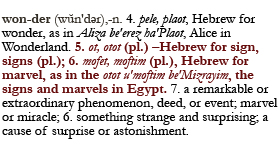
Illumination
